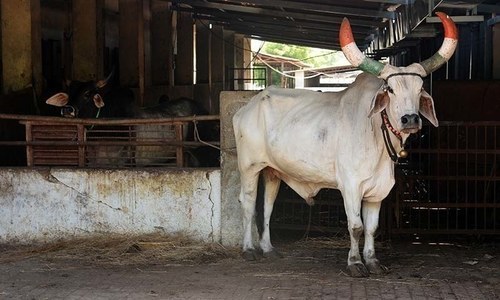Indian police are often complicit in killings carried out by cow vigilante groups, Human Rights Watch said on Tuesday, calling on authorities to take tougher action to halt lynchings.
The slaughter of cows — revered by Hindus — is a powder-keg issue in secular India. Men accused of killing or trading in cattle have increasingly been targeted since the Hindu nationalist government came to power in 2014.
Critics have accused Prime Minister Narendra Modi's governing party of pandering to fringe groups to win votes.
Read: Holy cows and Hindu crusaders cloud Modi's Indian reform drive
“Calls for cow protection may have started out as a way to attract Hindu votes, but it has transformed into a free pass for mobs to violently attack and kill minority group members,” said Meenakshi Ganguly, South Asia director at Human Rights Watch (HRW).
“Indian authorities should stop egging on or justifying these attacks, blaming victims, or protecting the culprits,” Ganguly said.
At least 44 people were killed in such attacks between May 2015 and December last year, the report said.
Thirty-six of the dead were Muslims and in almost all cases, police initially stalled investigations, ignored procedures, or were complicit in the killings and cover-ups, HRW alleged.
Police even filed complaints against victims' family members under laws banning cow slaughter, making them afraid to pursue justice.
The damning report said some members of the governing Bharatiya Janata Party had justified attacks on minority Muslims and low-caste Dalits who eat beef.
In one case in 2016, a vigilante group beat to death a Muslim cattle trader and a 12-year-old boy travelling to an animal fair in the eastern state of Jharkhand.
Their badly bruised bodies were found hanging from a tree with their hands tied behind them.
“If I stepped out, they would have killed me, too. My son was screaming for help, but I was so scared that I hid,” the report quoted the boy's father as saying.
In another case, the murder of a Muslim man by a mob in June 2018 was described in police records as a “motorbike accident”.
The report includes testimonies from relatives of victims, describing police threats and intimidation.
“They (police) also threatened us with arrest under cattle protection laws, saying they will put our whole family in jail,” the report quoted the brother of one victim as saying.
The slaughter of cows and the possession or consumption of beef is banned in most Indian states, and in some are punishable by life sentences.
Modi, who will seek a second term in office in elections due by May, has condemned cow vigilantism and urged a crackdown on groups using religion as a cover for violence.











































